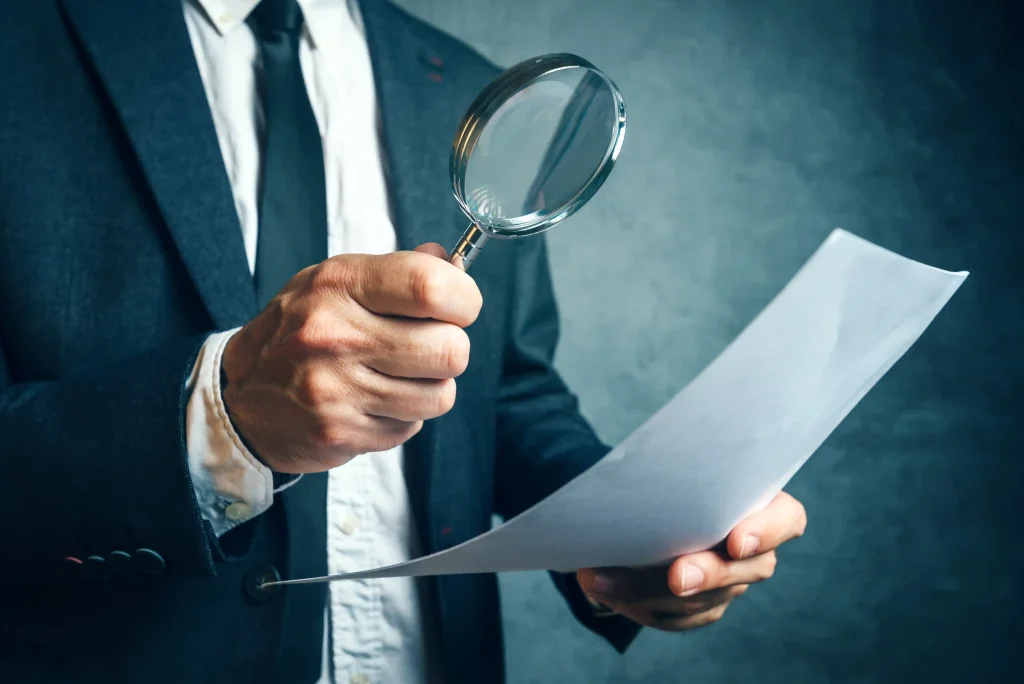Beyond detecting existing fraud, asset search investigations play an essential role in preventing it. By proactively using asset investigations, businesses can protect themselves from falling victim to fraud in several ways:
- Due Diligence for Business Partnerships and Mergers Before entering into a partnership, merger, or acquisition, an asset investigation provides insights into a company’s true financial health. Fraudulent companies may hide debts, overstate assets, or misrepresent their financial stability to appear more attractive. An asset search investigation can reveal these inconsistencies, helping businesses avoid entering into risky agreements.
- Evaluating the Financial Integrity of Key Personnel Key personnel, such as executives and high-level employees, have significant control over a company’s assets. Conducting asset investigations during the hiring process or periodically for high-level staff can help identify potential financial issues, such as undisclosed debts, that may make an individual more susceptible to committing fraud. This proactive measure is especially important in positions that handle finances or sensitive company information.
- Screening New Clients and Vendors Businesses often extend credit or enter into financial agreements with clients and vendors. However, fraudsters may disguise their financial instability or lack of assets to secure credit or contracts. Asset search investigations can verify a potential client’s or vendor’s financial standing, reducing the risk of financial loss due to unpaid debts or fraudulent activities.
- Monitoring Ongoing Business Relationships Fraud doesn’t always occur at the beginning of a business relationship. In some cases, it develops over time. Regular asset searches can help businesses monitor ongoing relationships, revealing any sudden changes in financial status that may signal fraudulent activities. For example, if a long-standing client suddenly shows signs of asset concealment or significant debt, it may indicate impending financial difficulties or fraud.
The Asset Search Investigation Process in Fraud Detection
Asset search investigations require expertise and access to specialized resources. Here’s an overview of the process:
- Initial Consultation and Goal Setting The first step is to understand the investigation’s purpose, whether it’s for a partnership, fraud suspicion, or debt recovery. This helps the investigator tailor the investigation to meet specific needs.
- Gathering Financial and Public Records Investigators access public records, financial filings, property records, tax documents, and proprietary databases. This initial search gathers a baseline of information and helps identify any discrepancies.
- Analyzing Data and Cross-Referencing Sources After collecting the data, investigators analyze it for inconsistencies, signs of undisclosed assets, or suspicious activities. They cross-reference data to ensure accuracy and verify any red flags that may suggest fraud.
- Reporting Findings and Recommendations The investigation concludes with a comprehensive report, outlining the assets discovered, any detected red flags, and recommendations for further action. This report can support fraud prevention efforts, legal actions, or business decisions.
Benefits of Asset Search Investigations for Fraud Detection
Implementing asset search investigations as part of your fraud prevention strategy offers several benefits:
- Increased Financial Transparency Asset search investigations increase transparency in business dealings by verifying reported financial information, helping businesses assess the trustworthiness of individuals and entities.
- Reduced Risk of Financial Loss By identifying fraud before it impacts your business, asset searches help prevent costly financial losses, protecting your company’s assets and bottom line.
- Legal Support in Fraud Cases If fraud is detected, the findings from an asset search investigation can serve as valuable evidence in court, supporting legal action and increasing the likelihood of asset recovery.
- Enhanced Reputation and Trust Businesses that actively work to prevent fraud build a reputation for trustworthiness. Clients, partners, and employees are more likely to feel secure in a company that prioritizes financial integrity.
Choosing the Right Investigator for Asset Search Investigations
To maximize the effectiveness of asset search investigations in fraud detection and prevention, work with a licensed and experienced investigator. Here’s what to look for:
- Expertise in Financial Investigations The investigator should have experience with financial investigations and a proven track record in asset searches and fraud cases.
- Access to Proprietary Resources and Databases Investigators with access to specialized databases can uncover information that’s not readily available, increasing the chances of detecting fraud.
- Clear Communication and Transparency Choose an investigator who communicates clearly, provides regular updates, and is transparent about the investigation’s process and costs.
Final Thoughts
Asset search investigations are powerful tools for both detecting and preventing fraud. By identifying hidden assets, verifying financial claims, and revealing suspicious activities, these investigations offer businesses a proactive approach to fraud prevention. Whether you’re assessing a new partnership, monitoring an ongoing relationship, or conducting due diligence, asset search investigations provide the financial insights necessary to protect your business.
With a reliable investigator and a well-implemented asset search strategy, businesses can reduce their exposure to fraud, safeguard their assets, and secure their financial future.


